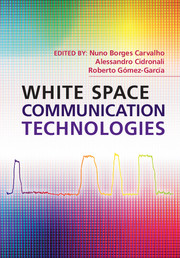Book contents
- Frontmatter
- Contents
- List of contributors
- Preface
- List of abbreviations
- Part I White space technology signal processing and digital design
- 1 White space technology, the background
- 2 Transceiver challenges for white space radio
- 3 Front-ends for software-defined radio
- Part II Adaptable receivers for white space technologies
- Part III Adaptable transceivers for white space technologies
- Index
- References
3 - Front-ends for software-defined radio
from Part I - White space technology signal processing and digital design
Published online by Cambridge University Press: 05 October 2014
- Frontmatter
- Contents
- List of contributors
- Preface
- List of abbreviations
- Part I White space technology signal processing and digital design
- 1 White space technology, the background
- 2 Transceiver challenges for white space radio
- 3 Front-ends for software-defined radio
- Part II Adaptable receivers for white space technologies
- Part III Adaptable transceivers for white space technologies
- Index
- References
Summary
Introduction
Conventional radios can be seen as analog signal processing systems. The appearance of digital signal processors (DSPs) has opened up the possibility of digitizing parts of the signal processing performed in a radio, namely the signals in the final stages having a narrow bandwidth. With the increase of the processing power of the DSPs and field programmable gate arrays (FPGAs), it became possible to process in the digital domain a larger proportion of radio system signals. Most companies have started to implement more and more radio components in the digital domain and in this way have provided a higher data rate and excellent voice quality at lower prices. The evolution from 1G radios to 4G and more recently to the long-term evolution (LTE) standard is a good example of this transformation from the analog to the digital domain of more and more components of radios. Due to the increased performance introduced by digitalization, this evolution presents a huge success in mass-markets all over the world. With this evolution, radios stopped providing a single waveform with a unique width standard and started providing several waveforms with multi-standard widths [1]. However, this approach has some problems because when a radio has several waveforms with several standard widths it needs to employ multiple chipsets and platforms [2].
Information
- Type
- Chapter
- Information
- White Space Communication Technologies , pp. 58 - 102Publisher: Cambridge University PressPrint publication year: 2014
